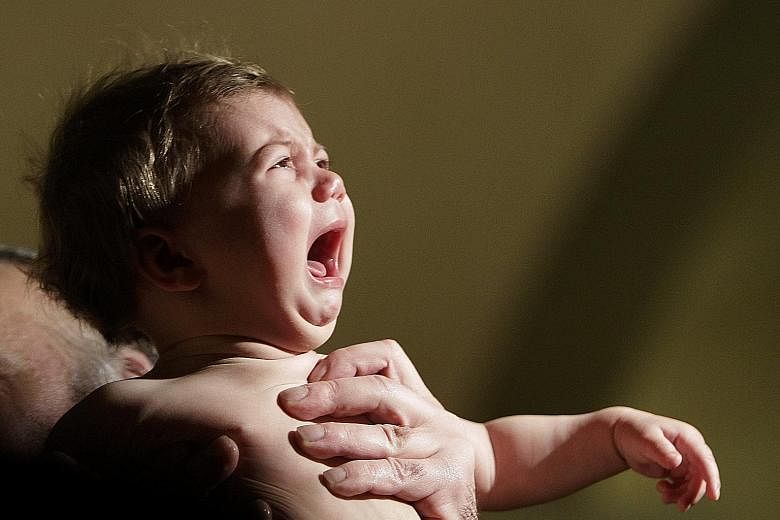LONDON • It is official. Denmark - as well as being the world's best country to live in for women with the second-happiest people and one of the best healthcare systems in Europe - has the most contented babies. Or, at least, the ones who cry the least.
According to research published in the Journal of Pediatrics, Danish, German and Japanese babies cry the least, while British, Canadian and Italian babies cry the most.
"I'm not surprised," Danish parenting expert and co-author of The Danish Way Of Parenting Jessica Joelle Alexander says.
"The first year of a child's life is considered so important in Denmark and that's such a different perspective to other countries. Danish parents are much less stressed because they get good maternity and paternity leave. The vibe is much calmer and, if mothers are getting more time off, that goes hand in hand with less stress, more contact, good routines and less crying."
She pauses before throwing in a final tip: "Oh, and Danish babies sleep outdoors a lot."
In research into how much babies around the world cry in their first three months, psychologists from Britain have created the first universal charts for normal amounts of crying during that period.
"Babies are already very different in how much they cry in the first weeks of life," says Professor Dieter Wolke, who led the study at Warwick University. "We may learn more from looking at cultures where there is less crying - whether this may be due to parenting or other factors relating to pregnancy experiences or genetics."
The highest levels of colic - defined as crying more than three hours a day for at least three days a week - were found in babies in Britain, Canada and Italy, while the lowest colic rates were found in Denmark and Germany.
On average, the study found, babies cry for about two hours a day in the first two weeks. They then cry a little more in the following few weeks until they peak at around two hours 15 minutes a day at six weeks. This then reduces to an average of one hour 10 minutes by the time they are 12 weeks old.
But there are wide variations, with some babies crying as little as 30 minutes a day and others more than five hours. The research was a meta-analysis of studies covering about 8,700 babies in countries including Germany, Denmark, Japan, Canada, Italy, the Netherlands and Britain.
Prof Wolke says the new crying chart will help health workers reassure parents whether their baby is crying within a normal range in the first three months or may need extra support.
In Denmark, a woman is entitled to four weeks' pregnancy leave (yes, before the baby is even born), followed by 52 weeks of paid leave that can be shared between parents.
Alexander, whose two children incidentally "didn't cry much" when they were infants, thinks there is another crucial reason why Danish babies cry less: breastfeeding.
"It's just the done thing in Denmark," she says of a country that routinely has among the world's highest breastfeeding rates.
According to a study last year in the Lancet, Britain has the lowest rate in the world.
"In other countries, there are continual discussions about whether you should or shouldn't breastfeed. In Denmark, breastfeeding has never gone out of style. And everyone does it for a year."
Alexander, who is American, but raised her children in the Danish city of Odense, adds: "I was a breastfeeding maniac, but I had a lot of problems. It was very difficult for me and most people in my situation would have stopped. My Danish family's response was: 'Well, if you want to breastfeed, you will,' so I was like: 'Okay, I'd better get back to it.'"
For Iben Dissing Sandahl, Alexander's co-author and mother of two teenage daughters who "didn't cry much" as babies, a lot of it comes down to the Danish attitude to life in general.
"We are an honest and authentic people," she says. "We are surrounded by social support and are less likely to become angry, sad or frustrated when our babies are crying. And we are good at embracing all kinds of feelings, so we aren't scared (if they do). Instead, we try to connect with the babies when they cry."
So Danish babies do cry after all: but, in Denmark, people are more accepting of it?
"Exactly," Sandahl says. "It's how babies communicate and it's about trying to understand it. What is the baby trying to tell us as a parent when they cry?"
GUARDIAN, REUTERS

